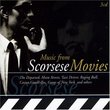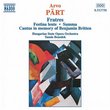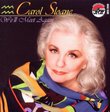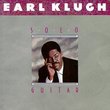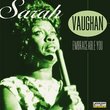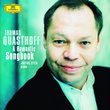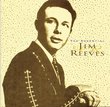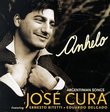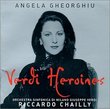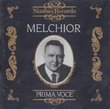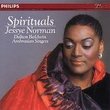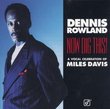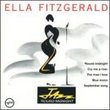| All Artists: Ruggero Leoncavallo, Giuseppe Verdi, Giacomo Puccini, Umberto Giordano, Hector Berlioz, Gioachino Rossini, Richard [Classical] Wagner, Mario del Monaco Title: Mario del Monaco: Historical Recordings 1950 - 60 Members Wishing: 0 Total Copies: 0 Label: Gala Release Date: 6/6/2000 Genre: Classical Style: Opera & Classical Vocal Number of Discs: 1 SwapaCD Credits: 1 UPCs: 675754393021, 759547030529 |
Search - Ruggero Leoncavallo, Giuseppe Verdi, Giacomo Puccini :: Mario del Monaco: Historical Recordings 1950 - 60
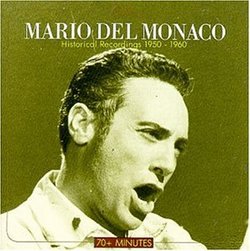 | Ruggero Leoncavallo, Giuseppe Verdi, Giacomo Puccini Mario del Monaco: Historical Recordings 1950 - 60 Genre: Classical
|
Larger Image |
CD DetailsSimilar CDsSimilarly Requested CDs
|
CD ReviewsThe Biggest Tenor Voice of the 20th century Rudy Avila | Lennox, Ca United States | 08/01/2005 (5 out of 5 stars) "Most music scholars and opera cognescentes credit the Italian from Florence Mario Del Monaco to have been blessed with the most powerful and biggest tenor voice in the 20th century. I wouldn't know about in all history, but for all I know, he could have indeed have the biggest tenor voice in history, since in the old days of opera -Baroque Era to the 19th century, purely lyric tenors with only some weight and power- like Caruso, were in vogue. When Monaco came along, he changed the course of tenor performances. He was singing in electrifying performances during the 50's- his career spanned the same time of Maria Callas' legendary performances. He even worked with Callas and Tebaldi in such operas as Norma and Andrea Chenier. Mario Del Monaco's most famous role was Verdi's Otello, still considered the greatest interpretation by any tenor of that role. This album finds him at his peak and he sings aria after aria in powerful, masculine, dynamic and beautiful voice, exemplifying the best way to sing in the Italian manner. Find out for yourself and put on this recording while listening to other tenors singing the same arias at the same time. I have tried it. Monaco's voice is far bigger and meatier than such celebrated tenors as Giuseppe Di Stefano, Franco Corelli, Jon Vickers, Placido Domingo and Luciano Pavoratti. Vickers had a big voice as well but even his voice is thinner next to the hefty voice of Del Monaco. Not only that but Del Monaco was the first real "star" tenor at a time when soprano divas were always the stars. He immersed himself in the roles he sang and brought to life for post-World War II audiences. This well-documented album showcases Mario's versatility in various Italian operas. The only non-Italian aria here is the last one, Siegfried's Aria and Monologue from Wagner's Die Walkure. But mostly, he sang in Italian as only singers from Germany itself sung in the operas of Strauss and Wagner. Americans or Italian singers sticked to the much beloved Italian repertoire. Monaco shows off his muscular vocal chords in the classic tenor signature aria - Vesti La Giubba from I Pagliacci, made famous by Enrico Caruso. In this aria, Pagliacci, just learning that his lady love Nedda has been unfaithful, is naturally crushed but has to perform that night and adopts a "show must go on" attitude. "Laugh, clown, laugh" is his motto in that aria. Monaco makes that aria more intense than any other tenor that followed him. His Manrico is the perfect vehicle for his heroic bravado technique and his Di Quella Pira is hands down the finest interpretation. Included here are arias from Otello, including the passionate "Esultate!" which soars above a powerful orchestra. Also here are stirring arias from Andrea Chenier and even a delightful rendition of "Largo Al Factotum" from the comic Rossini masterpiece The Barber of Seville. Surprisingly, Monaco does not seem perfect for such a role, since it seems to be vocally beneath him. Del Monaco was too serious and heroic sounding that such comic roles as a barber appeared like an odd stray from the norm. But it also proves his versatility I guess. For me, Mario Del Monaco was at his best in such roles as Manrico from Trovatore, Radames from Aida, Cavaradossi from Tosca (included here) Don Jose in Carmen, which he sung opposite Regina Resnik, Calaf in Turandot and Siegfried as well as Otello. Get this album and hear for yourself the voice that dazzled audiences and the man who is still beloved and talked about by opera lovers to this day. " One of the biggest voices of the past 50 years Steven A. Peterson | Hershey, PA (Born in Kewanee, IL) | 02/18/2007 (4 out of 5 stars) "Mario del Monaco was not the most elegant tenor; he was not a great actor. But, man, did he have a big voice! He had one of the most powerful tenor voices of the past 50 years. We're talking Richard Tucker and Franco Corelli power here (and maybe even more at that).
Some examples. He sings "Largo al factotum" from Rossini's "Il Barbiere de Siviglia." He takes it at a fast pace. This work is normally sung by a baritone, but del Monaco makes it his own anyhow. He has fun with this aria and it shows. For tenors, "Di quella pira" is a show off aria (from Verdi's "Il Trovatore"). The high C here is a splendid place to demonstrate one's voice. Del Monaco has the big voice for this; the high notes ring out. On the other hand, with the "shake" in this work, he is pretty rough and inelegant. But elegance was not del Monaco's forte; power was. His voice on the final notes sails above the orchestra and chorus. Verdi's "Tosca" has two showstoppers for tenors: "E lucevan le stella" and "Recondita armonia." His version of the former is powerfully sung. Again, not elegant, no great characterization--but powerfully sung. A stentorian voice deployed to good effect. His singing of the words "la vita" catches one's attention. As for the latter, more of the same. If elegance you want, do not attend to Mario del Monaco. If you are intrigued with power, then he is someone you might wish to listen to. "Vesti la giubba" was one of Caruso's most famous pieces. This aria, from Leoncavallo's "I Pagliacci," is one of the most well known works in the repertoire. Again, del Monaco's version is not graceful. His laughter works nicely; his voice is almost too much for this aria. Nonetheless, again, for those interested in the work of del Monaco, this is interesting to listen to. All in all, a nice introduction to the work of Mario del Monaco. Personally, I find his power wondrous to listen to; on the other hand, I wish that there were a bit more elegance and subtlety. But the power of his voice is a natural wonder! " |

 Track Listings (1) - Disc #1
Track Listings (1) - Disc #1